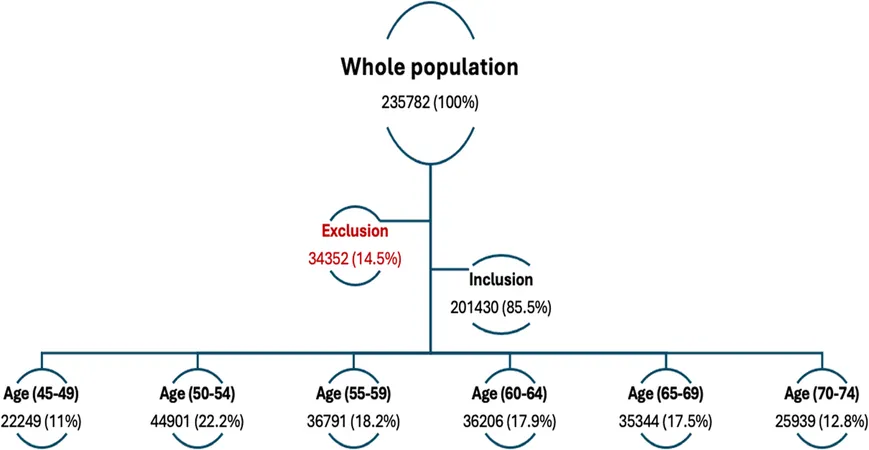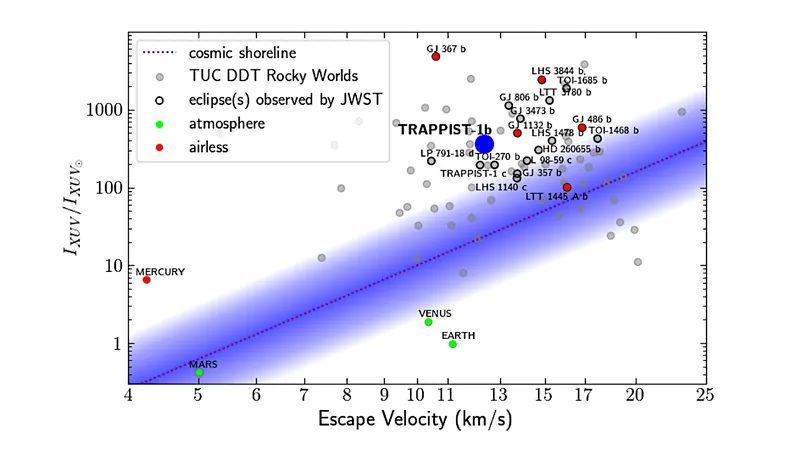
Why You Should Consider Starting Colon Cancer Screenings at Age 45 NOW!
2025-08-19
Author: Ming
Colorectal Cancer on the Rise in Younger Populations
Colorectal cancer (CRC) is garnering alarming attention as a leading cause of cancer-related deaths in the United States, with over 50,000 lives lost each year. Historically, the majority of cases were detected in those aged 50 and older, but a troubling trend shows an increased incidence in younger age groups. Factors such as obesity, alcohol use, smoking, and unhealthy diets are contributing to this shift, raising red flags in public health.
A Call to Action: Lowering the Screening Age
In light of these unsettling statistics, health authorities are recognizing the necessity for earlier screenings. Current U.S. guidelines now advocate initiating CRC screenings at age 45, rather than the traditional starting point of 50. This recommendation aims to address the significant number of cases diagnosed in individuals under 50, particularly those who present with advanced disease.
The Impact of Colonoscopies
Colonoscopy serves as a vital tool in early detection, allowing for both diagnosis and the removal of cancerous or precancerous tissues. Metrics like Adenoma Detection Rate (ADR) are key in assessing screening quality. Surprisingly, findings indicate that individuals in their forties often exhibit similar or even better adenoma detection rates compared to their older counterparts. This challenges long-standing perceptions about when to begin screenings.
Growing Adoption of Early Screenings
In a recent comprehensive study examining 235,782 colonoscopies performed between 2016 and 2022, a significant rise in screenings among those aged 45 to 49 was observed. This trend underscores increased institutional and public awareness surrounding early-onset colorectal cancer.
Polyp Prevalence: A Growing Concern
The study also revealed a stark age-related increase in polyp occurrences. Among patients aged 45-49, 14.7% were found to have at least one polyp, rising to 20.1% for those aged 55 and older. This suggests that even at younger ages, polyps—precursors to cancer—are notably prevalent, reinforcing the argument for early screenings.
A Case for Policy Change Based on Data
Findings showing similar detection rates of cancer in the 45-49 and 50-54 age groups provide compelling evidence for policy changes. These insights pave the way for integrating younger individuals into routine screenings, potentially catching cancers earlier when they are more treatable.
Financial Implications of Earlier Screening
Evaluating the cost-effectiveness of screening at age 45 has also demonstrated favorable outcomes. While there is debate about the financial viability of lowering the age, studies show that early detection can limit treatment costs and improve survival rates. For instance, initiating screenings at age 45 could cost-effectively yield better public health outcomes.
The Bottom Line: Act Now!
As statistics unveil a rising trend of colorectal cancer among those under 50, it’s crucial to reconsider screening guidelines. Early detection through screenings starting at age 45 can lead to timely interventions and potentially save lives. Awareness and action are essential to reversing the trend of this preventable illness. Don’t wait until it’s too late—consider advocating for earlier screenings in your community!




 Brasil (PT)
Brasil (PT)
 Canada (EN)
Canada (EN)
 Chile (ES)
Chile (ES)
 Česko (CS)
Česko (CS)
 대한민국 (KO)
대한민국 (KO)
 España (ES)
España (ES)
 France (FR)
France (FR)
 Hong Kong (EN)
Hong Kong (EN)
 Italia (IT)
Italia (IT)
 日本 (JA)
日本 (JA)
 Magyarország (HU)
Magyarország (HU)
 Norge (NO)
Norge (NO)
 Polska (PL)
Polska (PL)
 Schweiz (DE)
Schweiz (DE)
 Singapore (EN)
Singapore (EN)
 Sverige (SV)
Sverige (SV)
 Suomi (FI)
Suomi (FI)
 Türkiye (TR)
Türkiye (TR)
 الإمارات العربية المتحدة (AR)
الإمارات العربية المتحدة (AR)